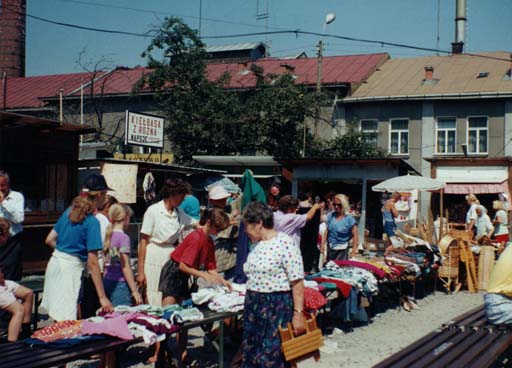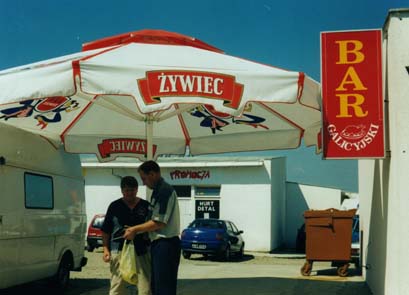| Return to main page |

Figure 23: The local clothes market
Though they were hardly old enough to meet Dr. Dylagowaís criterion, Maria and Wlodek had strong but diverging views on how people had coped with shortages in socialist days. They agreed that personal links had been vital in everyday life, e.g. to obtain supplies of meat from rural relatives, and also to get things done in the bureaucracy. It was common to acknowledge a favour by leaving a bottle of vodka, or indeed by opening it on the spot for immediate consumption, which had had disastrous effects on the productivity of the workforce in many factories and officies. Wlodek took the view that such exchanges had created strong bonds of reciprocity and genuine friendships, even between people whose social backgrounds and class position were quite different. In a system in which even petrol was a scarce good, lorry drivers with access to more than they needed might become the mates of university professors. The latter might offer some bureaucratic intervention or nomination for space at a socially owned holiday home in return. This was not seen as corruption, but as an exchange of favours in a context in which money income did not play a decisive role. Nowadays, in contrast, it was common knowledge that some officials took cash bribes, and this created a hierarchical relationship, devoid of any basis in friendship.
But Maria argued that all this was wishful thinking. In fact, she said, the socialist economy of shortages had not had such levelling effects. Rather, it had forced people to be instrumental about everything, including their personal friendships. There was therefore no need to be nostalgic. Corruption, she said, had been prevalent all the time, but at least it was easier to recognise it now. Prices were high, but everyone knew where they stood.
The conversation continued to focus on the economic changes that had taken place in Poland since the end of communism and Maria and Wlodek continued to disagree. She emphasised that not only had the overall standard of living risen but people had much more choice as to how they spent their money. Wlodek pointed out that incomes had fallen dramatically during the early years of postcommunism and people had come to feel fundamentally insecure. For example, his father had lost his job and, given his age, had little prospect of ever finding another. Social inequalities had greatly increased. Wlodek was unimpressed by the proliferation of new consumer opportunities. ëFor one thing, all this modernisation is mostly limited to a few big cities. Itís all very well for a few thousand people in Cracow to live as if they were Germans or even Californians, but for millions of people in our villages things have barely changed at all. In fact theyíve probably got worse. Anyway, I find thereís something shameful, even humiliating, in all this talk about Poland becoming integrated into Europe. This integration is just turning the whole world into one big supermarket. Who really wants it?í
Maria needed to buy some household goods, which were more cheaply available at a nearby ëwholesaleí centre. Ania could not understand that ordinary individual shoppers could make purchases at such centres. Maria snapped at her: ëI suppose you think we're not yet advanced enough to have wholesale merchants!í ëThat's not what I meant at all,í said an embarassed Ania. She tried to mend fences by offering to pay for some of the goods that Maria loaded into her trolley on the grounds that she was now a regular visitor to the household and should make a contribution. Maria refused and seemed even more irritated. Later they went out to supper in a bar named Galicia. They washed it down with several bottles of Galician beer. This time Ania was allowed to pay the bill for everyone, to her immense relief.

Figure 24: Galicia bar
| Return to main page |